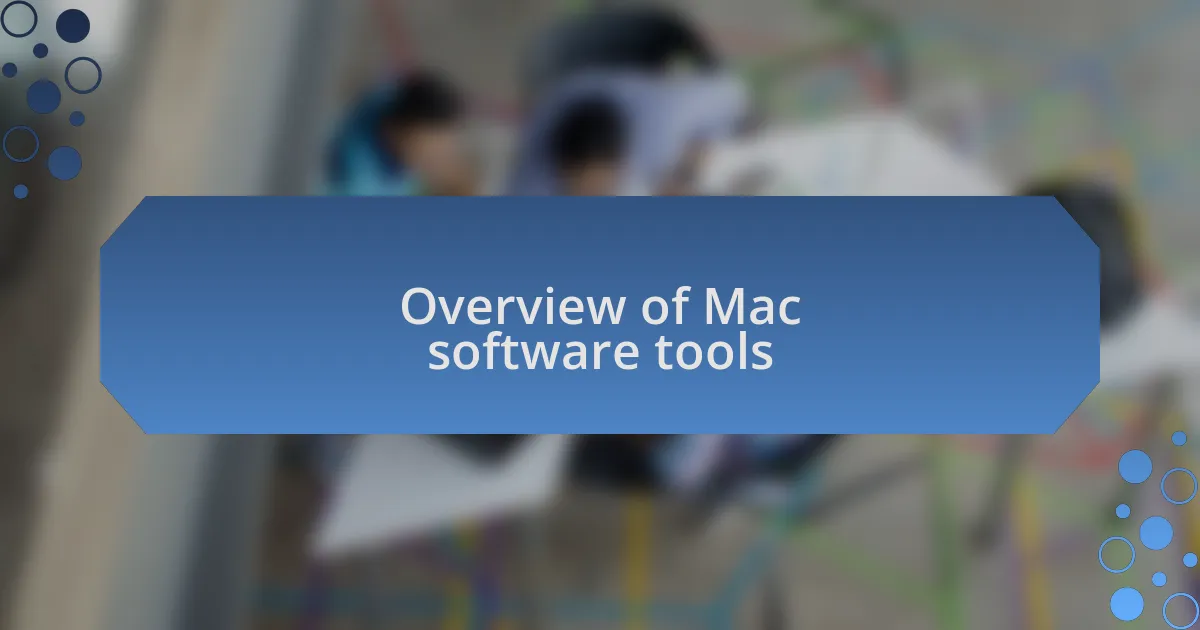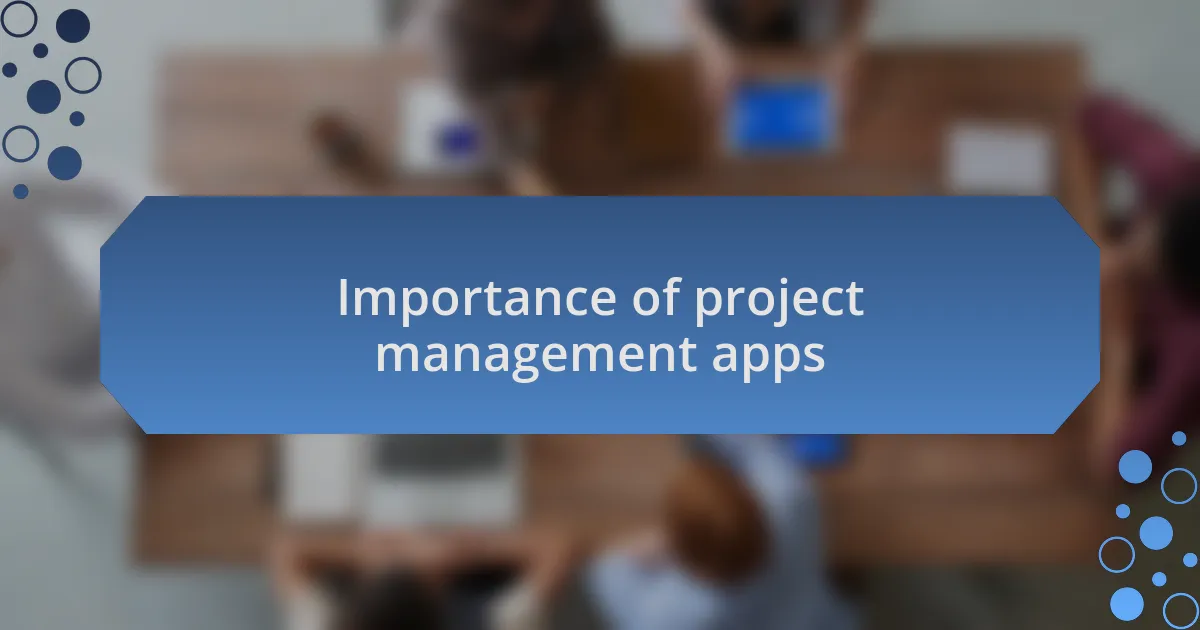Key takeaways:
- Project management apps enhance organization, reduce stress, and improve team collaboration by providing a structured approach to task management.
- Breaking tasks into smaller steps and establishing regular check-ins fosters better prioritization and clear communication among team members.
- Setting clear expectations and leveraging technology are crucial for overcoming confusion and enhancing productivity in project management.
- Celebrating small wins throughout the project lifecycle boosts morale and motivates teams by acknowledging progress.

Overview of Mac software tools
When it comes to managing projects on a Mac, the range of software tools available can be both exciting and overwhelming. I remember my first encounter with project management apps; I felt like a kid in a candy store, eager to try everything. The sleek interfaces and powerful features promised productivity boosts that piqued my curiosity.
Among the popular tools, I’ve found that options like Trello and Asana stand out for their intuitive designs. I once experienced a project derailment, but switching to a visual organizer like Trello helped me regain control quickly. What I appreciate most is how these apps allow you to visualize your tasks, making it easier to see the progress and areas needing attention.
Other tools, such as Notion and OmniFocus, offer deeper functionality that caters to more complex needs. I often wonder how long I could sustain productivity without them, considering the depth they provide in tracking details and timelines. It’s incredible how the right software can transform chaos into clarity, isn’t it?

Importance of project management apps
When I first started using project management apps, I quickly realized that they are essential for keeping chaos at bay. Without these tools, I often felt like I was juggling too many balls, and the risk of dropping one was always high. The structured approach these apps provide not only enhances organization but also reduces stress, allowing me to focus on what really matters: delivering results.
One pivotal moment came during a team project with tight deadlines. We were struggling to stay on track, and tensions were running high. Once I introduced a project management app, everything shifted. It was as if the fog had lifted; we could assign tasks, set deadlines, and communicate clearly in one centralized space. This clarity transformed our collaboration, and we not only met our deadline but exceeded our goals. Isn’t it fascinating how a simple digital tool can unlock the potential of a team?
Moreover, the ability to monitor progress in real time provides a sense of accomplishment that fuels further productivity. I often reflect on how motivating it is to watch a task move from “in progress” to “completed.” This visual feedback keeps me engaged and accountable, reminding me that each small step contributes to the bigger picture. Have you ever had that fulfilling moment of checking off a task? It’s thanks to these apps that I’ve learned to celebrate even the little victories along my project journey.

Tips for effective project management
When I manage projects, one tip I always find valuable is to break tasks down into smaller, manageable steps. I remember a project where the sheer size of the workload felt overwhelming. By dividing the work into bite-sized tasks, I could not only prioritize better but also create a clear roadmap for my team. Have you experienced that same sense of relief when a massive project suddenly becomes doable just by breaking it down?
Another effective strategy I’ve employed is to establish regular check-ins with my team. These meetings aren’t just about progress updates; they serve as an opportunity to foster open communication and address any roadblocks. I once found myself in a project where miscommunications were leading to duplicated efforts. After implementing weekly check-ins, it was astonishing how much smoother everything went. It’s like holding a compass that keeps everyone aligned on the same direction.
Additionally, I’ve learned the importance of being flexible and open to adjustments. Projects never go exactly as planned, and clinging too tightly to a rigid timeline can be counterproductive. I recall an instance where shifting deadlines turned out to be a blessing in disguise, allowing us to refine our approach and enhance the final deliverable. Embracing those changes often leads to better outcomes and fosters a more positive team environment. Have you ever found unexpected changes to be the catalyst for improvement in your projects?

Lessons learned from my experiences
Reflecting on my project management experiences, one major lesson I’ve learned is the significance of setting clear expectations from the start. I once spearheaded a project where the goals were vague, leading to confusion and frustration among team members. That chaos taught me that clear guidelines not only streamline processes but also empower the team to take ownership of their roles. Have you ever faced a similar situation where unclear expectations derailed your progress?
Another vital lesson centers around the value of leveraging technology. I remember struggling with outdated methods for tracking progress, and it felt like navigating a maze without a map. Once I started using project management apps that integrated seamlessly with our workflows, the clarity they provided transformed our productivity. It made me realize how the right tools can illuminate the path forward. How has technology changed the way you approach project management?
Lastly, I’ve come to appreciate the importance of celebrating small wins throughout the project lifecycle. During one particularly taxing project, we began recognizing individual milestones, and it genuinely boosted morale. This practice fostered a sense of accomplishment and camaraderie among the team. It reminded me that acknowledging progress, no matter how small, can fuel motivation. Have you tried celebrating milestones, and if so, what impact did it have on your team?